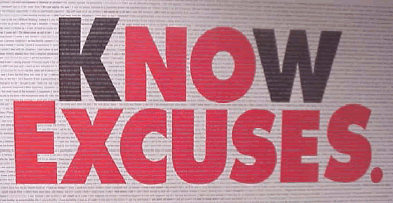Willpower
What is willpower? Some magical thing in your mind that allows you to resist desserts, get to the gym for your workout no matter what, and work hard to achieve your dreams everyday, even though you’re exhausted? Self-control and discipline are words often used in place of willpower. Psychological scientists define willpower as:
- the ability to delay gratification, resisting short-term temptations in order to meet long-term goals
- the capacity to override an unwanted thought, feeling or impulse
- the ability to employ a “cool” cognitive system of behavior rather than a “hot” emotional system
- conscious, effortful regulation of the self by the self
- a limited resource capable of being depleted
Check out this awesome article from the American Psychological Association for an in-depth look at willpower. But if you don’t want to read all that, I’ve summed up the fascinating parts in the next 2 posts. 🙂
I’ve often heard of willpower described as a “muscle” that can be developed and also overworked. Well, as a personal trainer… I guess I can get behind that. Everyone has it, it may just be underdeveloped or inactive. It’s not hopeless! You can develop the ability to delay gratification.
But truth be told, I really don’t like the idea of willpower. I wish the word would erase itself from the English language. Willpower is typically seen as “our ability to overcome whatever gets in our way through sheer personal force of mind” whereas self-control is “read as the ‘the self that is in control’ but it can also be read as ‘that which brings the self under control.'” (You can read more about what Matthew Lieberman thinks about willpower in this slightly confusing article). In the end, he says, “at least self-control hints at the fact that it is part of the self, a part we identify with, that is being controlled. Willpower just sounds so empowering and hides the true beneficiary [that is, society] of so much of our effortful self-control.” I completely agree (if I ignore his ramblings about abductions and Star Trek). I don’t like willpower because so many people use it as an excuse. Because it’s such an intangible idea, they think that they can just cite their lack of willpower and… Poof! It’s a non-issue. Whatever dream they had will never be. All because of their inadequate supply of this mysterious thing called willpower.
Excuses and Praises
I’ve heard it all. “Oh, I would wake up everyday at 5 a.m. to run, but I don’t have the discipline for that.” “I’ve tried giving up meat/sugar/smoking/. I just don’t have the willpower for it.” You’ve probably said that yourself, at some point. And yet, you’ve probably praised someone else for their admirable self-restraint. “Look at you, passing up that dessert! You have so much self-control!” Ask yourself this: have you ever complimented yourself on your own willpower? Maybe not. Well, you should start. Start acknowledging the little battles that you fight and win everyday.
Whatever you want to call it: willpower, self-control, self-discipline is important. It is something to be complimented on and to be proud of. In a study of undergraduate students, self-control scores correlated with higher grade-point averages, higher self-esteem, less binge eating and alcohol abuse, and better relationship skills. Children who exhibited high self-control were assessed again as adults and found with better physical and mental health, fewer substance-abuse problems and criminal convictions, and more advantageous savings behavior and financial security. (Also from the American Psychological Association article on willpower). But… don’t berate yourself if you don’t think you have it. Trust me, you do. And you can build on it.
Money Can’t Buy…
So, if self-control so important, how do you get more of it? Buy it, of course. Just kidding! Willpower can’t be sold, not that people haven’t tried. You know… those diet pills that suppress appetite… those expensive juice cleanses that promise to banish sugar cravings… the abuse of Adderall pills, promising focus and productivity…
Does it work? Shelling out the money? Developing another addiction? Maybe for a time. But it’s certainly not the answer to success. Not for weight-loss. Not for your dream job. Not for that 4.0 GPA. No, as with any sustainable behavioral change, it takes time. It takes baby steps. And interestingly, you can build it in any aspect of your life, and it will carry over into other parts.
Improve areas of your life while doing other things? The multi-tasker’s dream come true!
The downside? Using your willpower in one aspect of your life can also deplete your resources in other parts of your life. It’s a two way street.
Hop on the Bandwagon
The point is, developing and strengthening the ability to delay gratification can be a solution to a whole lot of problems in your life that popping a (bunch of) pill(s) could never solve. The more self-control you have, the more it can build. Yes, it can get worn out. But building the ability to delay gratification isn’t like yo-yo dieting. You can’t fall off the willpower bandwagon.
Oops you got stressed and ate three brownies last night… But you still turned in that paper by the deadline. Oops you stayed out too late last night with friends… But you still woke up in time for work. Oops you procrastinated so hard yesterday… But you still managed to pull together most of what you needed for today. It’s rare that someone completely loses their self-control or sense of responsibility to themselves or others (although if you have lost that entirely, I’m pretty sure that’s what it’s like to be depressed. Then you need to find a good psychologist ASAP).
So for the most part, you always have something to build on. Small steps it is. As I said before, recognize and praise yourself for those small achievements of self-control. Whether you’re looking to develop a healthy diet and lose weight, or be more efficient and productive to achieve your dream job, any progress in self-control in any area of your life is a step in the right direction. That doesn’t mean trying to control every aspect of your life. That’s called burning out. That’s called overtraining your willpower.
In my next post, I’ll talk about some ways to add to your current willpower reserves and develop a stronger ability to delay gratification without burning out.




